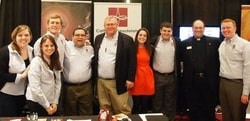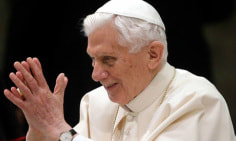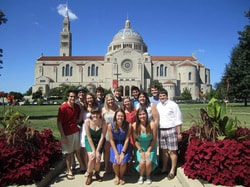|
The 3rd Annual Mid-Atlantic Congress for Pastoral Leadership (MAC) is set to take place in Baltimore, MD starting today, Thursday, February 27 and going until Saturday, March 1. For the second year in a row, the Catholic Apostolate Center will be playing a part in this gathering of pastoral leaders from around the mid-Atlantic region.
As part of our involvement with MAC, the Catholic Apostolate Center is a platinum sponsor of the event. Our Director Fr. Frank Donio, S.A.C. and advisor Barbara McCrabb will be doing a presentation on the New Evangelization through Collaboration. Fr. Frank will also be presenting with staff from the USCCB on the New Evangelization Toolkit. Additionally, the Catholic Apostolate Center staff will be exhibiting our resources in the exhibit hall. One special session that we will coordinate again this year is a series of Collaborative Conversations. This is a networking session, of sorts, that allows the participants to get to know each other, but allows them to get to have deeper conversations beyond the usual “What’s your name? Where are you from?” banter. During the Collaborative Conversations, participants are urged to discuss what they hope to get out of the conference and why they are attending as well as talking about greater issues facing them pastorally, in their churches, organizations, and schools. They are given the time, with a facilitator, to be able to talk about the good things that they are doing as well as taking some time to discuss the challenges that they face. Last year at MAC, I was fortunate to be able to watch the fellowship and brainstorming that occurred during the Collaborative Conversations. It was encouraging to see many different people from all over the country come together and share their experiences and learn from one another. It was inspiring to be a part of the little community that was formed over the few days of the Collaborative Conversations. We encourage you to join us at the Mid-Atlantic Congress this year! You can register for the conference here. Be sure to sign up for Fr. Frank and Barbara’s presentation on Thursday afternoon as well as the New Evangelization Toolkit Bootcamp session where Fr. Frank will be a part of the presentation team. The boot camp will take place before the conference begins on Thursday. We invite you to join us for the Collaborative Conversations session and be a part of the community this year. If you have already registered for MAC, but have not signed up for the Collaborative Conversations, you can contact the organizers at [email protected]. For more details on our work this year at MAC, click here . To read our current Catholic Apostolate Newsletter on MAC which highlights our resources on New Evangelization and Collaboration, click here. Monica Thom Konschnik is the Administraton & Finance Manager for the Catholic Apostolate Center.
0 Comments
A major contention that many people – both young and old – have with the Church is that it is an institution of “Thou Shalt Nots” and other moral imperatives that have little or no relevance in the modern world. In essence, the Church is seen as little more than an outdated social services agency, or even worse, a dismal and ahistorical museum perpetuating a false sense of reality. This emerging perception of the Church parallels a larger cultural shift from the acceptance of objective truth toward a secular relativism.
In an address given in 2012 to a group of U.S. bishops in Rome for their ad limina visit, Pope Benedict XVI proposed that the Church’s response to this “eroded” perception of reality is one of the greatest “spiritual and cultural challenges of the new evangelization.” Because of the Catholic Apostolate Center’s commitment to being an instrument of the new evangelization, this bears much significance on the direction of our work. But what impact does – or should – this emerging situation have on our daily lives? In the words of the Holy Father, “the Church in the United States is called, in season and out of season, to proclaim a Gospel which not only proposes unchanging moral truths but proposes them precisely as the key to human happiness and social prospering”. As Catholics, we are called to uphold the perceptive vision of reality that has been gifted to us by the Holy Spirit through Divine Revelation. It is only through upholding this vision that we can ever hope to accurately understand our place in the world around us and “the deepest truth about our being and ultimate vocation, our relationship to God.” As Catholics, we are beneficiaries of an astonishing intellectual legacy that was developed over the course of two millennia by scholars who examined these mysteries through the complimentary lenses of faith and reason. Contrary to popular opinion, the Church’s moral teaching is not merely a hodge-podge of archaic prohibitions, but a doctrine that is congruent with the logical nature of reality and informed by Divine Revelation. As the Pope explained in his address, the moral teaching of the Church “is not a threat to our freedom, but rather a ‘language’ which enables us to understand ourselves and the truth of our being, and so to shape a more just and humane world. She thus proposes her moral teaching as a message not of constraint but of liberation, and as the basis for building a secure future.” If we are to succeed in being apostles of the New Evangelization, then one of our most critical objectives should be to proclaim the beauty, consistency, and relevance of the Church’s moral teaching, without which we would be left with an incomplete view of our own humanity. Informed by this teaching, it is also important that we serve as prophets in the public sphere of these truths. As Pope Benedict XVI emphasized, “it is imperative that the entire Catholic community in the United States come to realize the grave threats to the Church’s public moral witness presented by a radical secularism which finds increasing expression in the political and cultural spheres.” Even more pertinent to the work of the Catholic Apostolate Center, the Holy Father went on to say that “the preparation of committed lay leaders and the presentation of a convincing articulation of the Christian vision of man and society remain a primary task of the Church in your country; as essential components of the new evangelization, these concerns must shape the vision and goals of catechetical programs at every level.” Blessed John XXIII was once quoted as saying the following: “We are not on earth to guard a museum, but to cultivate a flourishing garden of life.” The New Evangelization is not concerned with re-presenting a forgotten memory from the past, but with re-proposing the living and eternal truth of Jesus Christ that continues to sustain His Church. The Church’s moral teaching is just one part of this truth, but as the Holy Father makes clear, it is an essential part to humanity’s self-understanding. Brett Garland is a Collaborator with the Catholic Apostolate Center. Audio of the Holy Father’s address available here. CNS Report about the Holy Father's address. Editor's Note: This Post was originally published on January 21, 2012 This Sunday’s gospel from Matthew asks us to love not only our neighbor, but our enemy as well. It says:
“You have heard that it was said, 'You shall love your neighbor and hate your enemy. But I say to you, love your enemies and pray for those who persecute you.’” It is easy to hate those who cause us pain, but God calls us to love them instead, to demonstrate the perfect love that He shows us. As children we are always told to treat others with kindness and respect, and loving those who we do not like is a challenge that continues throughout our lives. How do we turn the other cheek? Jesus says, “Offer no resistance to the one who is evil” “Should anyone press you into service for one mile, go for two miles.” God asks us to embrace the challenges of our enemies and instead of responding with hate respond with the love He shows us. He points out that many of our enemies are not so different from us, “For if you love those who love you, what recompense will you have? Do not the tax collectors do the same? And if you greet your brothers only, what is unusual about that? Do not the pagans do the same? So be perfect, just as your heavenly Father is perfect.” How can we translate this to our everyday life and what is the benefit? Find an “enemy” a rival in a class, a competitive sibling, a disgruntled roommate. It is easy to respond to their negativity or the feeling that they are persecuting you with equal hatred or unpleasantness. But, this benefits no one. If we instead respond with peace and love, we stop a cycle of hatred and persecution and show to them the love the God shows to us. This furthers peace throughout the world and within our society, it has the power to solve great conflict and bring the smallest bit of happiness to someone. God’s love is perfect and can only be achieved and spread if we his children are actively working to spread it, and if we are at the same time resisting the urge to respond to hatred with hatred. The beginning of this week’s gospel references the “Eye for an eye” form of justice in society, and it asks us to rise above this need to get even and bring about change through not just acceptance of our enemies, but love of them. Eileen Welch is Regent of Catholic Daughters of the Americas Court #2646 at the Catholic University of America. "The apostolate of the laity derives from their Christian vocation and the Church can never be without it."
These words come from the opening lines of the “Decree on the Apostolate of the Laity” (Apostolicam Actuositatem), one of the nine decrees that come out of the Second Vatican Council. They are quite moving and powerful documents that were handed down to us by the council fathers. This particular document on the laity shows that the Church is dependent on the apostolate of all people. But the term “apostolate” seems so daunting; clearly the word is rooted in the idea of being an apostle. I tend to think back to the Twelve Apostles, which creates a certain amount of anxiety. How can I even think about living up to the great examples of these twelve? Yet they are our example, and our apostleship is essential to the life of the Church. In the Church we tend to use the word apostle quite a bit and in many different ways. It appears in terms such as: apostolic, apostolate, and apostleship. To find a secular answer, I looked up the word “apostle” in a Merriam-Webster dictionary. In using a dictionary, my hope was that I might come to a better understanding of what it means to be an apostle. The first definition that I came across for apostle was "one sent on a mission." This first meaning really helps expand the idea of the New Evangelization in simple terms. The discovery of this definition led me to formulate the following question: "What is our mission as baptized Catholics?" This is a very important question that has been the subject of major debate. A simple answer is that we are called to go out into the world around us and proclaim the Good News of our Lord, Jesus Christ. How this is accomplished is a decision that must be made by each one of us. We must find our own niche in the greater mission of Christ. We have been given a divine mission that we must go out and complete. An interesting dilemma of this universal apostolic call is that for some reason people tend to shy away from it. I think that people tend to think that they are not worthy of such a calling or that they are not holy enough. Nothing could be further from the truth. We have all been given the necessary gifts from God to be able to be an apostle. These gifts are not always automatically known to us. Because of this, it is essential that we go out into the world and discover what our God-given talents are. Once we have become aware of our gifts, the task at hand becomes more manageable and attainable. Personally, I have found that being an apostle in the world today can be quite difficult. Through my active search and prayer to recognize the gifts and talents God has given me, I have discovered that I am someone who is easy to talk to. In response to this realization, I make myself available for people, especially my close friends, and I make sure that I both listen and give general advice when necessary. Doing this, however, can be difficult because there are many instances when time is limited, and I need to make a decision about what to put on hold. This can be difficult, so I stop to think about the things on my agenda versus the needs of the person seeking my counsel. Taking this time to reflect makes the decision quite clear. I developed a series of questions that has helped me in this process. I’ve found it very beneficial to go over them every now and again, particularly during the Lenten season. The questions are: Do I understand what it means to be a true apostle of Christ? Do I have an understanding of my mission at this current time in my life? Am I making decisions that help in my mission? Do I understand the gifts that God has given me to fulfill my mission? Do I thank God for these gifts and abilities? My hope is that you find these questions as helpful as I have. Mary, Queen of the Apostles, pray for us! Pat Fricchione is the Research & Production Associate for the Catholic Apostolate Center. Editor's Note: This post was originally published on March 27, 2012. If you haven’t heard by now, tomorrow is Valentine’s Day. The very mention of this day solicits cheers and jeers from so many. Our culture reminds us that this is the day to show love to your friends and family. If you walk into any retail store I’m sure you’ll be bombarded with Valentine’s Day sales, candies, cards, flowers, etc. There is no lack of a reminder that love (and several shades of red) is supposed to be celebrated on this particular day.
I’m not here to give you the history of the day or the particular saint (or non-saint) it may be based on. If you want to read more about the Catholic history of the day, feel free to click here. I’m here to remind you of something that I feel very strongly about. Love is meant to be shown every day, to be celebrated every day, not just one day a year. Often times the “valentines” that are exchanged contain the term “Will you be mine?” We should remember that no one is ever alone on Valentine’s Day. Everyone has a valentine. Jesus Christ is the single most important valentine that we have and I guarantee you, he doesn’t get many cards - but perhaps people just think he’s allergic to chocolate. We should take comfort in the fact, however, that we are taking time out of our usually hectic lives to acknowledge that we all share love with someone. My only piece of advice is to not let it end when the chocolates are gone, or after the cards are exchanged. We should continue to express the affection we have to the people in our lives who are always there for us, who know us best, and often times feel the same way about us, every day. Let us not also forget that Jesus shows us his love everyday as well, we should follow his example. All this being said, however, I hope that you do take the time tomorrow to express some love. Call your parents, your grandparents, your husband or wife, friends you haven’t spoken to in a long time - reach out and remind them that you love them today, and every day. Chris Pierno is the Media and Marketing Manager for the Catholic Apostolate Center Last week’s post talked about wounds and how they can help us to grow, and lead us to a closer relationship with God. Recently, I’ve come to experience this in a much more significant way. Today, February 11th, marks three weeks since one of my best friends was killed in an act of senseless violence. There are no words that can help make sense when something like that happens. In the weeks since his death, I have struggled to understand. The usual questions come to mind: Why did this happen? Why to someone so young, with so much life in front of him? At the end of the day, all I’m left with is one word: why. I’ve spent countless hours in prayer, trying to understand, trying to figure out the why.
When we lose a loved one, asking why is a common reaction. Oftentimes, the why can be seen easily. Death can be the end of a long journey, a welcome end to suffering, the culmination of a life well lived. I have experienced this type of loss before, but now, experiencing death in a completely different way, I’m struggling to find the why. When death is sudden, unexpected, and especially when it happens to someone so young, the why is hard. It is now especially that I am learning to accept that this life is so much bigger than me, than all of us. I remember all the joy and love my friend brought to all of us who were blessed to know him. A few nights after he died, I had a fortune cookie, which contained the following fortune: “It’s not the years in your life, but the life in your years that count” Now, I am not one to take advice from Chinese fortune cookies, but on that night, at that time, that piece of paper was the reminder I needed. Pain and sorrow and evil are all inevitabilities that come from God’s gift of free will. God does not want evil in the world, but rather He permits it because He gave us free will. I know that my friend led an amazing life, and lived it to the fullest. He was a friend, a brother, a son, a cousin, and so much more. He would have been an incredible husband, father, and impacted the lives of many others. Although he never made it to that point, because of the actions of another, he did experience so much in his short life. We ask why, hoping to make sense of the hard things that happen in our lives. Sometimes we get answers but often we don’t. It is in those hard times that we must learn to trust in God. Loss is hard, pain is hard, but there is a comfort in laying all of our pain in front of God, a reminder of Christ’s suffering on the Cross. We all go through difficult times in our life; the important thing to remember is that we are not alone in our suffering. Rebecca Ruesch is the Blog Editor for the Catholic Apostolate Center. I carry wounds. I carry scars. I carry pains. I carry all of these pieces of sadness, loneliness, challenge, and despair inside me. Some wounds are visible and others are buried deep inside my heart. I have been a part of causing wounds and others have inflicted me with wounds. I have healed from and I have ignored my wounds. I carry wounds but I also am learning how to ask for help in binding them.
I recently attended a retreat that focused on grace and the “wounded healer.” Throughout the time I had the opportunity to reflect on where I am on this life journey and what has happened, is happening, or will happen in the future. Immediately, I thought of Henri Nouwen’s book Wounded Healer and how the paradox of someone who is broken reveals the mystery of discovering how to heal. The retreat led me to a deeper understanding of the interior life, God lives in me and has been broken, but he also wishes to heal and be healed. Nouwen writes, “The man who articulates the movements of his inner life, who can give names to his varied experiences, need no longer be a victim of himself, but is able slowly and consistently to remove the obstacles that prevent the spirit from entering. He is able to create space for Him who heart is greater than his, whose eyes see more than his, and whose hands can heal more than his.” He shows how naming the wounds we experience leads to the natural desire to open up to the grace of the Holy Spirit. Jesus invites us in to create that space. We see how he was an example of healing and woundedness in his ministry, being vulnerable and patient, sacrificing his life in love. We see it in his state of being God and Man, his inviting the twelve, his working miracles for the visibly and the spiritually sick, and even in his silence when he knew what was to come on the cross. Working in ministry I find that aiding in the healing of others comes more easily than letting myself be healed. This theme showed me how difficult it is to expose weaknesses and be vulnerable. Sometimes the simple acknowledgement of a sin or experience is overbearing. In the retreat setting I opened myself up to engage with my wounds and seek guidance in understanding what I will need to heal. I also had to recognize that the healing might not be a quick process. Words from Helen Keller, who dealt with a physical wound of blindness, showed me the wound’s potential to foster strength and growth. She writes, “Face your deficiencies and acknowledge them; but do not let them master you. Let them teach you patience, sweetness, insight.” We all carry wounds. In some form we react to them, hide them, or learn to mend them. One of the prayer services that concluded the retreat involved reflection on the sacrament of Anointing of the Sick. The leader spoke about how we do not hear about this sacrament in the way we do the number of joyful sacraments of First Communion, Confirmation, or Matrimony. In many ways it shows how even those who believe in the power of healing find it difficult to expose their wounds. Showing our wounds reveals a part of us that we are not proud of or afraid of knowing. How different would our world be if it seemed more acceptable to open up and to anoint each other in our physical and spiritual sicknesses! In so many ways it is a privilege to be a part of that sacramental healing, to listen and allow someone to share with you what he or she is going through, or to share something yourself. When we engage with the grace that works in our lives and look at our wounds we see how the two converge. Grace is there to help comfort and guide us in the Holy Spirit. Acknowledging the work of grace and receiving its gifts help us to recognize how our wounds have the ability to make us stronger. Pope Francis spoke about embracing the wounds of Christ in others and how it transforms both them and us. “We need to touch Jesus' wounds, caress Jesus' wounds, bind them with tenderness; we must kiss Jesus' wounds, literally. Just think: what happened to St. Francis, when he embraced the leper? The same thing that happened to Thomas (the apostle): his life changed”. Our lives change when we encounter and embrace Jesus, others, and ourselves in our state of being wounded. Like the sacrament of healing, the visible act of carrying our woundedness and asking for healing leads us to love and receive better. Sophie Jacobucci serves as a second-year Echo Apprentice in the Diocese of Manchester, NH. This year I have been blessed with an opportunity to live my faith through ministry, specifically peer ministry. I live in a college residence hall, where I minister to young women who are my age or younger. I create events for community bonding, host night prayer, and lead a Renew group - a weekly faith sharing group that talks about the Gospel. In addition, I pray for my residents, foster individual relationships with each one, and aim to help them grow in burning desire for Christ. How do I do all of this, you might ask? Being a busy college student with a job and a full course load, I pray…often. Also, I understand the importance of an invitation. Peer ministry is about personal invitation. Asking someone to join me at Renew, or to come along with me to night prayer, or telling them about Mass is how I send out my invitation on a daily basis. This invitation is designed specifically for each of my residents, but anyone can be invited! We are all called to invite.
In this new year, I am trying to connect my ministry through the example of our Holy Father and his approach to the New Evangelization. Sending out an invitation is the first step in this mission. Often, someone longs for inclusion and it can be as easy as letting them in. The other step that I am trying to embody in my ministry finds its roots in the Gospel of Matthew: “Jesus replied: ‘Love the Lord your God with all your heart and with all your soul and with all your mind. ‘This is the first and greatest commandment. And the second is like it: ‘Love your neighbor as yourself’” (Matt 22: 37-39). For myself, the New Evangelization challenges me to reach out and love all of my brothers and sisters, maybe even in ways I’ve never thought of before. It challenges me to fit my 21st century college culture into connections with the Gospel and traditions of my faith. We are all called to love. Finally, ministry is a call for us to, "Follow [Him], and [He] will make you fishers of men" (Matt 4: 19). Each of us is called to be a witness to the Word, each of us is called to be the hands and feet of Christ to others, and each of us has the ability to do so. There are five easy ways to begin your own ministry if you don’t know where to start! 1. Smile and say, Hello. 2. Ask how someone is doing. 3. LISTEN. 4. Respond lovingly. 5. Say a prayer for them. I have been blessed this year with a way of life that enables ministry to my peers, but it also has helped shape my own faith in Christ and my personal humility. So, now I invite you to go and grow in your own faith! We are called to minister to others and this ministry brings us closer to Christ. Krissy Kirby is a Senior Early Childhood Education Major and Resident Minister at The Catholic University of America |
Details
Archives
July 2024
Categories
All
|
About |
Media |
© COPYRIGHT 2024 | ALL RIGHTS RESERVED









 RSS Feed
RSS Feed